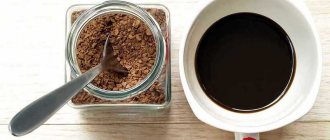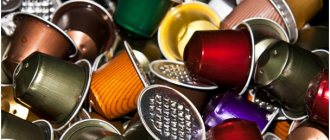Endocrinologist, nutritionist, creator of the author's nutrition program Vadim Krylov:
— In relation to coffee, all people are divided into two types. The first ones break down caffeine quickly, the second ones slowly. These features are innate, they are determined genetically and are associated with enzyme activity. For people whose body quickly breaks down caffeine, coffee is beneficial and even affects life expectancy, increasing it. But for the latter, for whom this substance takes a long time to break down, coffee is harmful.
As a result of research on the benefits and harms of coffee, scientists have found that for those who quickly metabolize (break down) caffeine, 1-2 cups per day reduce the risk of myocardial infarction and stroke by about 20%, 3-4 cups of coffee per day reduce the risk of these states by 12%, and 4-6 cups - by 3-6%. For slow metabolizers, 1-2 cups per day increases the risk of heart attacks and strokes by 3-6%, 3-4 cups by 12%, and 5-6 cups by approximately 20%.
Article on the topic
Soluble quality. Results of examination of coffee in cans In the West, special genetic tests are sold that can be used to determine whether you quickly break down caffeine or not. But in fact, this can be understood even without them. It's simple: if after a cup of coffee you feel cheerful, joyful, and toned, then you are a fast metabolizer and coffee is good for you. If these effects do not appear immediately, but after 4-5 hours, then coffee is bad for you.
The aroma of coffee and its unique taste give fans of the drink real pleasure. But, if we talk about its benefits and harms, there is no clear answer. Coffee beans contain a lot of bioactive substances, both beneficial and not. The most famous of them is caffeine, which has a lot of pharmacological properties and, unfortunately, even has side effects.
In addition to caffeine, coffee contains beneficial antioxidants. Studies have shown that after a cup of aromatic drink, the amount of these substances in the blood increases. The best known and most powerful antioxidant is chlorogenic acid. It helps lower blood sugar, protects the liver and prevents the development of cancer. However, heavy roasting of beans, milk and sugar added to coffee reduce antioxidant activity.
Foam on top, foam on bottom. How to make lattes and cappuccinos at home Read more
There are also so-called diterpenes in coffee. The most famous of them are kafeol and cafestol. Regular consumption of coffee increases cholesterol. But, on the other hand, they prevent the development of Parkinson's disease - the protective effect of coffee against this disease is well known.
But the most negative substance formed when roasting coffee beans is acrylamide. It is classified as a carcinogen. In addition to coffee, acrylamide is found in bread, pastries, any fried potatoes (fries, chips, etc.), cookies, crispbreads and all products with an appetizing crispy crust. However, scientists and experts are inclined to believe that coffee is not a carcinogenic product due to the presence of acrylamide, since no direct connection has been found between drinking coffee and the development of cancer. In addition, coffee is not at all a champion in terms of acrylamide content - in the same baked goods and fried potatoes there is an order of magnitude more of it.
Question answer
Why can't you drink fast food with coffee?
How caffeine in coffee affects the body
- acts as a mild doping, increasing physical abilities
- reduces fatigue and anxiety
- improves mood
- improves mental activity
- speeds up information processing and improves reaction
Prevents the development of the following diseases:
- obesity, type 2 diabetes mellitus and associated metabolic syndrome . For example, the dependence of the risk of developing diabetes on coffee consumption: the risk is 35% lower in those who drink 6 cups of coffee per day, and 28% lower in those who drink 4-6 cups per day, compared with those who drank less than 2 cups per day. But decaffeinated coffee does not reduce the risk of diabetes.
- Parkinson's syndrome and disease
- skin cancer (coffee prevents the negative effects of ultraviolet radiation).
How to replace coffee (5 ways to maintain your performance at a high level without coffee)
So, it is important to avoid coffee and caffeine if it has a bad effect on you. It is a good idea to reduce your intake over 2-4 weeks. Depending on how long you drank coffee, in what quantity and for what reason.
While you're at it, I suggest you try healthier alternatives and start looking for the real cause of your lack of energy. After all, in fact, coffee does not solve our problems, but masks them and ultimately makes them worse. So, on the agenda are 5 ways to be more energetic without coffee.
Clean and fresh water in sufficient volume (can you drink regular water instead of coffee and get an invigorating effect? - yes!)
To become more energetic now, the easiest way to start is by drinking enough water. After all, even mild dehydration makes us tired, and we think worse.
Many people make the mistake of drinking little water, and remember about it only in those moments when they feel thirsty. Although in fact, by this point they are already leading themselves to a state of dehydration!
And if dehydration reaches 2%, then fatigue and weakness appear, and the body and brain cannot work at their full capacity.
There is one big pleasant moment in all this: often in order to relieve headaches, concentrate and reduce stress levels, we do not need a cup of coffee, but a sufficient amount of water throughout the day. Therefore, your first priority is to drink more water (about 8-10 glasses per day).
To find out exactly how much water you need to drink during the day (and this is an individual question!), I recommend reading my large detailed article about water.
Matcha green tea
Matcha tea is powdered green tea leaves rich in antioxidants, vitamins, minerals and the highest natural concentration of the amino acid L-theanine.
Matcha may help improve concentration and memory, support the immune system, promote weight loss, and protect against cancer.
Finally, matcha is a great alternative to coffee. A serving of matcha tea (just over half a teaspoon) contains plenty of caffeine. Moreover, caffeine from matcha enters our body very slowly and smoothly (within 8 hours), and usually does not lead to a decrease in energy, sleepless nights or hyperexcitability.
Green smoothies
Lots of greens and vegetables in your diet can significantly increase your energy levels. All thanks to the vitamins and nutrients they contain! And green smoothies are just a great way to include more greens, vegetables and fruits in your nutrition plan.
I suggest you don’t put it off and try the smoothie recipes from my free book now. You can drink such smoothies 2-4 times a week.
Protein smoothies
Protein is one of the important sources of energy for our body. Research shows that adequate protein intake maintains normal blood sugar levels and improves our alertness, concentration and good mood.
To feel energized, try making protein smoothies several times a week. This will be a great snack after breakfast or lunch.
For a protein smoothie, add all of the following ingredients to a regular green smoothie:
- 1-2 tbsp. chia or flax seeds
- A serving of high quality collagen or hemp/pea protein
- Instead of water, add ½-1 cup of nut, sesame or pumpkin milk (or if you have a powerful blender, you can simply blend a handful of seeds or nuts with water for a serving of milk)
- 1-2 tbsp. natural 100% cocoa without sugar (optional, but delicious)
Vegetable juices
If you want to cheer up, try drinking freshly squeezed vegetable juices a couple of times a week.
When making green juice, make sure that at least 70-90% of the mixture contains vegetables and not fruit. If you read my article about fruits, then you already know that freshly squeezed fruit juices should not be drunk often because all the fiber has been removed from them. But along with them we can drink too much natural sugar, which will enter our body very quickly (again due to the lack of fiber).
For vegetable juice, add to the juicer: 7 large cucumbers or celery sticks, ½ apple and a bunch of herbs. And add the juice of ½-¼ lemon to the finished juice. During the cold season, you can add a small piece of ginger root while making juice.
Is decaffeinated coffee healthier for your heart?
This coffee was specially created as a safe alternative to regular caffeinated coffee. But later it turned out that its effect on the heart and blood vessels is not so clear. In particular, under the auspices of the American Heart Association, a large study was conducted on the effects of various types of coffee on blood vessels. It turned out that decaffeinated coffee, on the contrary, can contribute to the development of atherosclerosis, heart disease and strokes. It increases the blood content of fatty acids by 18%, from which two harmful forms of cholesterol are formed.
Article on the topic
The secret of a fragrant drink. How professionals choose coffee
How to switch to coffee without sugar and why you need it
“When I met my husband, he didn’t know what coffee without sugar was, generously flavoring each cup of cappuccino with three or four bags. There were few children, so we walked a lot and drank coffee, respectively. One day, the level of trust between us reached the stage that he agreed to share a cappuccino without sugar with me, opening up a world of completely different coffee.”
This real story of the blog editor, as well as interesting scientific and pseudo-scientific facts, formed the basis of the article, which we hope you will not only read, but also generously comment on. So, coffee with sugar: pros and cons.
When coffee with sugar is harmful
For some, coffee without sugar is money down the drain. Someone, on the contrary, is a convinced supporter of the idea that good coffee does not need any sugar.
Let's give some numbers. According to the American Heart Association, the average woman should consume no more than 6 teaspoons of sugar per day, while the average man should limit himself to 9 teaspoons per day. At the same time, the proven permissible amount of coffee consumed should not exceed four cups of 200 ml per day. That is, adding two teaspoons of sugar to each cup brings us closer to the maximum allowable amount of sugar. But in addition to coffee, we consume many other sugar-containing products...
But it’s not just the effect of sweets on our health: professional baristas and q-graders argue that a truly good drink loses its individuality and subtle nuances when sugar is added.
When with sugar it’s good
But sugar is not always definitely bad.
As we wrote earlier, in 2010, Spanish scientists proved that the combination of coffee and sugar has a positive effect on our cognitive abilities. Simply put, when we put sugar in our coffee, our brain starts to work more productively. Significantly more productive than if there was pure coffee in the cup. It has to do with glucose itself (yes, our brain loves it!), and how exactly it enters into a chemical reaction with the components of coffee, allowing us to become more attentive and enhancing our ability to remember and retrieve the necessary information from memory. So sweet coffee is a great thing for intellectual workers, university students and those who urgently need to “get ready” at any cost.
Coffee beans LavAzza “Qualita Oro”, 500 g 752 rub.
Lavazza “Qualita Oro” coffee beans, 250 g 351 rub.
Ground coffee in instant Nescafe “Gold”, 750 g -25%
745 rub. 993 rub.
Compagnia Dell'arabica "Jamaica Blue Mountain" bean coffee, 1500 g 48,960 rub.
Ground coffee Lebo “Extra”, for Turkish, 75 g 61 rub.
Coffee capsules Coffesso “Coffee set”, assorted for Nespresso coffee machine, 50 capsules -25%
961 rub. 1281 rub.
Coffee beans Paretto “Celesto”, freshly roasted, 1000 g 1619 rub.
Instant coffee Ambassador “Platinum”, 95 g 230 rub.
View all coffee
Why do we like coffee with sugar?
It's all about subconscious attitudes. We perceive sweets as nourishing and healthy (in nature, ripe fruits, honey, and nuts have a sweet taste), and bitter and sour as low-nutritive or even potentially dangerous (poisonous plants). Coffee, on the other hand, most often has a pronounced bitterish and sour taste, which our receptors automatically read as “inappropriate.” That is why it is calmer and more pleasant for us to “hide” this bitterness under a sweet taste.
It is noteworthy that, when added to coffee, sugar does not camouflage the bitterness, but neutralizes it in a certain way. This interesting process is called dimerization and is the “sticking” of caffeine molecules to each other under the influence of a chemical reaction.
As a result, they seem to play hide and seek with our taste buds - we taste only half the bitterness that we would feel if we did not add sugar, because the caffeine molecules, glued together, have a smaller area of influence on our taste buds.
Why do we like coffee without sugar?
You may have already heard about coffee descriptors, but if not, read on.
Descriptor is a unit of description of the taste and aroma that coffee has. And here everything is much broader than just “sour”, “bitter” or “sweet”. In 1995, q-graders from all over the world adopted a unified system that allows them to most fully describe the flavor and aroma qualities of coffee using the so-called flavor wheel. This circular table contains all the most frequently occurring notes that can characterize this drink. There are, for example, “smoky”, “latex”, “dark green” and “grapefruit” and about a hundred others. Their formation is influenced by several factors - the degree of roasting, the method of processing the grain, the type of coffee, and terroir. And you can learn to distinguish all these flavor shades! The first step to such a deep understanding of coffee is participation in cuppings, which are often even free.
With sugar, you will not be able to catch such subtle nuances - it drowns out all the most valuable shades. And they are worth it, really! This is a completely different level of love for coffee.
How to switch to coffee WITHOUT sugar?
Strengthening cognitive abilities is, of course, great, but this phenomenon is not always more important than health. Many of us have to monitor the amount of carbohydrates that enter our body. So, even if you like your coffee sweet despite all the above, it may be worth starting the slow journey of moving from two spoons of sugar to a “clean” drink with no additives.
It's not as difficult as it seems at first glance. It is not at all necessary to completely deny yourself sweets right away; it is enough to slightly reduce the amount of sugar that you put in your cup of coffee. A gradual reduction in the usual “dose” of sweets will help you smoothly move to a new level of perception, when sugar really seems unnecessary to you. And yes, then you will be surprised to discover that the taste of coffee is much richer than it previously seemed.
To wean off sugar, experts recommend choosing
Brazilian coffee varieties that have less acidity.
It is very convenient to start this transition with milk-based coffee drinks, for example, latte or cappuccino: due to the lactose (milk sugar) content, they will not seem as deadly bitter as espresso or Americano.
And when you get into the habit of drinking cappuccino without sugar, it will be much easier to feel all the charm of other types of coffee. This is the truth, supported by personal experience.
Where else is there caffeine?
There are many products that contain caffeine in doses comparable to coffee. For example, there is a lot of it in carbonated drinks made from cola nuts. In addition to drinks, caffeine can be found in chocolate and products made with it. There are four commonly used caffeine-containing plants around the world: tea, coffee, the tropical plant guarana, and Paraguayan mate tea. In Russia, guarana and mate are often found among weight loss products. To be honest, such products containing only caffeine are not the most successful invention. They are used as an energizer (the so-called products that increase activity). Their benefits are questionable, but the side effects are quite real. In fact, such products help the development of caffeine addiction.
Food products, including beverages, do not need to indicate the amount of caffeine, with the exception of energy drinks. But you need to know its dosage.
Caffeine content in products
| The product's name | Amount of caffeine (average), mg | Serving Size |
| Carbonated drinks | 36-45,6 | in an iron jar, 330 ml |
| Espresso coffee | 100 | cup 50-60 ml |
| Coffee black | 80-135 | cup 200-220 ml |
| Instant coffee | 65-100 | cup 200-220 ml |
| Black coffee, decaffeinated | 3-4 | cup 200-220 ml |
| Instant coffee, decaffeinated | 2-3 | cup 200-220 ml |
| Black tea | 35-40 | cup 200-220 ml |
| Green tea | 30 | cup 200-220 ml |
| Instant tea | 15 | cup 200-220 ml |
| Dark chocolate | 31 | one small tile |
| Chocolate white | 10 | one small tile |
Coffee and pregnancy
Can pregnant women drink coffee or not? And if possible, then how much? The debate around this has been going on for a long time. It was found that women who drank coffee during pregnancy had short and low-weight babies. Agree, the problems are serious and there is cause for concern. After all, caffeine from the drink is quickly absorbed into the blood of the expectant mother, freely passes through the placenta and enters the fetus, which does not yet have its own enzymes that break down caffeine. Thus, the amount of caffeine in the mother’s blood and in the fetus’s blood becomes approximately the same, which negatively affects the development of the child. Therefore, doctors recommend that women planning pregnancy reduce their caffeine intake from all sources. And as soon as pregnancy is confirmed, make every effort to stop or significantly reduce caffeine consumption.
Why shouldn't you drink coffee to cheer yourself up or wake up?
“Coffee has a tonic effect, and this can further lead to a state of increased excitability. If a person drinks coffee often and in large doses in order to cheer up, then after a while he will get exactly the opposite effect due to the depletion of those mediators that cause this tone. Roughly speaking, neurotransmitter function will be impaired,” says the nutritionist.
You should not drink large quantities of coffee in the morning, when the body releases the stress hormone, cortisol. Caffeine can inhibit its synthesis, and then over time the body will get used to being supplied with substances to wake up, and will no longer be able to wake up without an appropriate dose of caffeine. A person will simply develop a coffee addiction.











